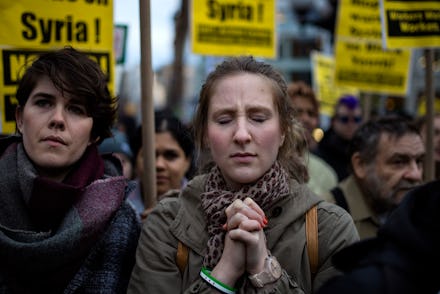Why aren't millennials leading an anti-Trump anti-war movement?

Since President Donald Trump's election, a sudden eruption of protests have risen to meet each of his measures, whether that's pushing the courts to move against the Muslim ban or putting the heat on Democrats to reject cabinet appointees.
So when Trump launched 59 cruise missiles on a Syrian airfield, organizers and progressives posed a question solidly ignored for a decade: What would it take to revive the anti-war movement in the United States?
One of the troubles facing the next generation of activists is that war is all they've ever known. Unlike the struggles of the Vietnam era, or even the Iraq War, today's activists grew up in a climate of conflict that began in 2001 and has no end in sight. The military has achieved a place of primacy in U.S. foreign policy. Now, Trump's presidency offers an opportunity to revive a movement that fizzled under President Barack Obama, beginning with a new understanding of the role of anti-war work in the broader scope of anti-Trump resistance.
"Anyone younger than 25 has never lived in a moment that's not defined by the United States being engaged in an overseas war," Vietnam scholar David Kieran said in a phone interview. "The omnipresence of war, and the notion of the war without end, can create the conditions under which war becomes ever-present."
It was easier to fight against war when Americans knew what they were up against. During Vietnam, the overwhelming majority of Americans — urban or rural, liberal or conservative — knew someone who was directly affected by the war, if not someone who was drafted.
The U.S. fought a war unprovoked against a people involved in a domestic struggle, with all the atrocities of war televised for the folks at home. All the while, there were leftist Americans who were politically sympathetic to the Vietnamese.
Now, far less than 1% of U.S. citizens serve in the military — and just under half come southern states. They fight on an unseen multitude of fronts, out of sight of the media, on behalf of a public frightened by vague terroristic threats and who just want to be sure that something is being done.
"These wars are increasingly fought in an aura of secrecy that just didn't exist before and through covert government action that make it difficult to organize around," Stephen Miles, Director of anti-war coalition Win Without War, said in an interview.
For student groups like Students for a Democratic Society — a vital force in the history of the campus anti-war movement — this means doing extra work to get students riled up about war the same way they naturally gravitate toward issues like police reform, economic equality and racial justice.
"Getting people involved in ant-war work is often very hard, because it's not as visible," Ian Decker, national organizer for SDS, said in an interview Monday. "Right now, the U.S. is involved in things like drone strikes and and funding for rebel groups — it's less in the everyday lives of Americans. It's easier for people to ignore it."
"The omnipresence of war, and the notion of the war without end, can create the conditions under which war becomes ever-present."
When Decker first got involved with SDS, he said the activism scene was "silent." But that's all changed. Since election day, SDS has seen a groundswell of interest, with dozens of new chapters popping up across the country. Now, Decker is working with organizers to help work imperialism back into the conversation for a generation that's been focused on issues of inequality on our front steps.
"Every bit of work we do is anti-war," Decker said. "If we're in solidarity with refugees, it comes back to war. If we're doing anti-racist work, we show how the way police oppress communities is like an occupying army."
And that, organizers said, is the central task at hand: Reminding a new generation of activists that U.S. involvements overseas fuel the social justice issues that progressives fight for at home.
"We have to come to an understanding that those values doesn't stop at the waters edge," Miles said. "If security forces can't kill people in America, we need to understand it's not OK for them to kill people in Fallujah. We don't have one set of morals and values at home and one set abroad."
Another challenge for the anti-war movement is a generational divide, between those that resisted the Bush administration and the rise of the military industrial complex, and a later cohort that's been more focused on issues of racial justice and inequality at home.
"Partnering with activists from proceeding decades could be powerful in terms of helping an emerging generation of activists on the left meaningfully structure their activism," David Kieran said. "To ignore those earlier moments in activism and start from scratch is to miss out on powerful lessons in history that could be useful."
That work has begun, steadily. On Sunday night, an organizing conference call by MoveOn.org, attended by tens of thousands each week, finally turned its eyes toward Syria. Organizers are preparing for "predictable emergencies" — the range of likely events to come, such as terrorist attacks at home — and preparing for Trump's response to these crises.
"Every bit of work we do is anti-war."
The missile strike on Syria was a shot across the bow of the left. A slumbering anti-war movement perked its ears, perhaps ready to wake. If ever there was a time, the time is now.
"This is a long haul we're engaged in," Anna Galland, the executive director of MoveOn.org said on Sunday. "We're less than 100 days into the Trump era, and the movement is only building. Not every day will look like the Women's March."
"Give us some time."